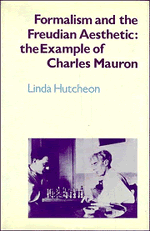Book contents
- Frontmatter
- Contents
- Preface
- Acknowledgments
- Introduction
- Part I The critical formation: science, formalism, and aesthetic contemplation
- 1 Early roots: science, Bloomsbury, and Roger Fry
- 2 The attraction of formalism
- 3 Art and science
- 4 Toward psychocritique: from “spiritual” to “psychological”
- Part II Psychoanalysis and literary criticism
- Conclusion
- Appendices
- Notes
- Index
1 - Early roots: science, Bloomsbury, and Roger Fry
Published online by Cambridge University Press: 12 January 2010
- Frontmatter
- Contents
- Preface
- Acknowledgments
- Introduction
- Part I The critical formation: science, formalism, and aesthetic contemplation
- 1 Early roots: science, Bloomsbury, and Roger Fry
- 2 The attraction of formalism
- 3 Art and science
- 4 Toward psychocritique: from “spiritual” to “psychological”
- Part II Psychoanalysis and literary criticism
- Conclusion
- Appendices
- Notes
- Index
Summary
[Mauron's] passion for literature and the plastic arts was at least as strong as his love of science. He brought to his renewed contemplation of the nature of literary and plastic beauty that unhesitating confidence in experimental methods and that precision of thought with which his scientific work had endowed him.
roger fryBORN JUNE 27, 1899, at St. Rémy-de-Provence, Charles Mauron did not plan a career as a psychoanalytic critic of literature. In fact, he did not receive his first literary degree until 1954, and was sixty-four years old when he received his Doctorat és Lettres from the Sorbonne and took up his first and last brief teaching post at the Université d'Aix in his native Provence. Mauron's early intellectual leanings had been toward the physical sciences. After receiving his Diplôme d'Ingénieur Chimiste at Marseilles in the spring of 1921, he went on to become an assistant in Industrial Chemistry. In 1924, he received his Diplôme d'Etudes Supérieures de Sciences Physiques. His thesis on the crystalline structure of soaps was awarded the prize of the Due de Villars at the Académie de Marseille. A gifted, or certainly a competent scientist, Mauron was ready to take up his first laboratory position in the government service when a worsening eye condition (detached retinas) forced a radical change in plans. Abandoning science and its precision, which depended upon vision, he turned to the arts.
- Type
- Chapter
- Information
- Formalism and the Freudian AestheticThe Example of Charles Mauron, pp. 17 - 34Publisher: Cambridge University PressPrint publication year: 1984



